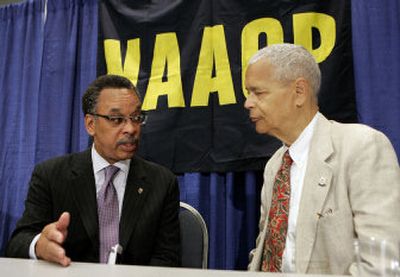NAACP still awaits presidential visit

WASHINGTON – Like a patient suitor, the NAACP has been waiting a year for an answer from the president of the United States.
Will George Bush finally meet with the nation’s oldest civil rights organization?
On Saturday, the start of the group’s 97th annual convention, the leaders of the National Association for the Advancement of Colored People were still waiting. “We’re ever hopeful, ever optimistic, ever looking forward,” said NAACP Chairman Julian Bond.
Bond wanted to make sure his words sounded friendly to Bush, who is the only president since Warren G. Harding in the early 1920s not to have visited the organization: “If he comes, we’re going to give him a good old NAACP welcome.”
Administration officials have signaled that, after Bush returns from a summit of world leaders in Russia, he might address delegates at this year’s convention. Either way, relations between the NAACP and the Bush administration appear to be entering a guardedly friendlier phase following years of distance between the Republican president and the civil rights group with a heavily Democratic following.
Bush offered a conciliatory gesture late last month, when he toured the National Civil Rights Museum in Memphis, Tenn., posing for photos with his arm around Benjamin L. Hooks, the NAACP’s former director.
The civil rights group has sent overtures of its own. NAACP President Bruce S. Gordon, a former Verizon executive, has made no secret of his wish to improve ties with the White House since taking the helm of the civil rights group last August. He has attended meetings with Bush and White House senior aide Karl Rove on the government’s response to Hurricane Katrina and other matters.
Yet even as the NAACP and White House consider a potentially dramatic convention appearance by the president, difficult issues divide them.
Many civil rights advocates remain appalled at the government’s response to the devastation brought by Hurricane Katrina to poor gulf communities. Indeed, Katrina rebuilding and economic needs of the poor are among the major concerns of the NAACP convention.
NAACP officials are miffed over an Internal Revenue Service audit that threatens to strip the group of its tax-exempt status. The IRS announced the audit shortly after a 2004 speech by Bond in which the chairman slammed Bush administration policies on education, the economy and the war in Iraq.
The NAACP has been dueling with the IRS over the dispute and plans to challenge the matter in federal court.
The civil rights organization repeatedly has found itself on the opposite side of key issues with the Bush administration and Republican-controlled Congress.
The NAACP opposed the nominations of John G. Roberts Jr. and Samuel A. Alito Jr. to the Supreme Court. It assailed budget cutbacks aimed at the Equal Employment Opportunity Commission, and is committed to a vision of government that includes social programs that are anathema to many in the Republican Party.
Democrats dominate the lineup of politicians scheduled to address this year’s convention, including party luminaries Sens. Hillary Rodham Clinton of New York, Edward Kennedy of Massachusetts, Harry Reid of Nevada and Barack Obama of Illinois, and Rep. Nancy Pelosi of California.